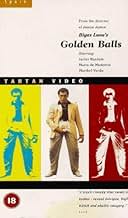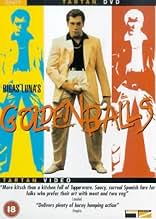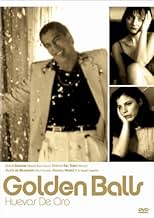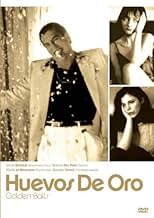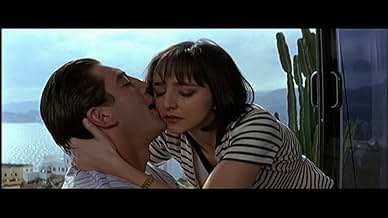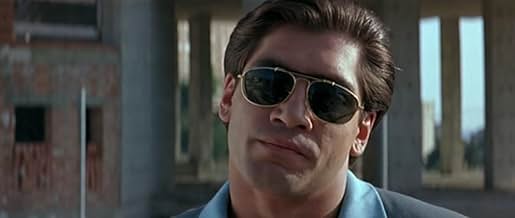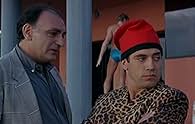AVALIAÇÃO DA IMDb
6,1/10
4 mil
SUA AVALIAÇÃO
Um trabalhador da construção civil usa seu charme e ousadia na tentativa de obter recursos financeiros suficientes para construir o projeto de seus sonhos.Um trabalhador da construção civil usa seu charme e ousadia na tentativa de obter recursos financeiros suficientes para construir o projeto de seus sonhos.Um trabalhador da construção civil usa seu charme e ousadia na tentativa de obter recursos financeiros suficientes para construir o projeto de seus sonhos.
- Direção
- Roteiristas
- Artistas
- Prêmios
- 4 vitórias e 3 indicações no total
Alessandro Gassmann
- El amigo de Melilla
- (as Alessandro Gassman)
Benicio Del Toro
- El amigo de Miami
- (as Benisio Del Toro)
Francesco Maria Dominedò
- El Mosca
- (as Francesco Mª Dominedo)
Francisco Casares
- El productor
- (as Paco Casares)
- Direção
- Roteiristas
- Elenco e equipe completos
- Produção, bilheteria e muito mais no IMDbPro
Avaliações em destaque
Lots of rather drrunken partying and explicit sexual activity do not disguise the fact that Golden Balls tells a sad story. Bardem, as Benito the young construction worker consumed with ambitions, aspiration, and sexual desire, is very fine. I would give him most of the credit for making this an interesting film, but Bigas Luna, the director, shows great skill in his handling of Benito's tangled relationships with three women and his slick maneuvering to gain financing for his consuming desire to build the tallest skyscraper in the city. Benito scores success in business and with his women, but in the end meets his downfall, losing money and prestige as his shoddy building practices are exposed. Even worse, it is made clear to him that he is not as good in bed as his gardener, Bob, played by Benicio del Toro in what is little more than a cameo but very convincing.
So, announces the DVD. But, this was a disappointing film. Not particularly bad but definitely not that good. Rather more crude and MTV video-like than the more subtle and masterful Jamon Jamon.
None of the characters are likable, the lovely Penelope Cruz of Bigas Luna's first film replaced by vacuous supermodels (in comparison, maybe they are great actresses) and it all reads like a tawdry and cheap paperback that you'd pick up at motorway service station.
Which, maybe is how Luna wanted it. Maybe he really is that repelled by the capitalist, nouveau-riche alpha male who believes his 'balls' not only rule his life but everybody else's, too. I know I am, and most people would be, too. Asked why Javier Bardem's lead character is sporting two gold Rolex's, he announces back "I have two balls, so I have two Rolex's".
Artistically there is little merit to this film, but it is about overblown, over-macho stereotypes and how they think they can walk over everybody. There are nods to Dali (the nude with ants over her pubic region is an extreme example) and there are more phallic insinuations in Goldenballs than any other film I know of. From Gonzalez (Bardem) Towers, intended to be the tallest tower on the Med, in which Luna loosely stretches a fabric of some kind of story around, with his dodgy dealings and cost-cutting.
Like, possibly his Tower, Gonzalez, and his potent sexual erections, does come a cropper, which is of some redemption, admittedly, but not enough to save the film. There's an early role for Benecio del Torro as the Miami-set gardener who happens to do more than service the sprinkler....
What finally made me only award two stars was the poor DVD quality. It's of video standard, plain and simple.
I bought Goldenballs as I wanted the three films in Luna's 'Iberian passion' trilogy, of which it is the middle. I'm seriously hoping that the final part, 'The Tit and the Moon' is an improvement.
None of the characters are likable, the lovely Penelope Cruz of Bigas Luna's first film replaced by vacuous supermodels (in comparison, maybe they are great actresses) and it all reads like a tawdry and cheap paperback that you'd pick up at motorway service station.
Which, maybe is how Luna wanted it. Maybe he really is that repelled by the capitalist, nouveau-riche alpha male who believes his 'balls' not only rule his life but everybody else's, too. I know I am, and most people would be, too. Asked why Javier Bardem's lead character is sporting two gold Rolex's, he announces back "I have two balls, so I have two Rolex's".
Artistically there is little merit to this film, but it is about overblown, over-macho stereotypes and how they think they can walk over everybody. There are nods to Dali (the nude with ants over her pubic region is an extreme example) and there are more phallic insinuations in Goldenballs than any other film I know of. From Gonzalez (Bardem) Towers, intended to be the tallest tower on the Med, in which Luna loosely stretches a fabric of some kind of story around, with his dodgy dealings and cost-cutting.
Like, possibly his Tower, Gonzalez, and his potent sexual erections, does come a cropper, which is of some redemption, admittedly, but not enough to save the film. There's an early role for Benecio del Torro as the Miami-set gardener who happens to do more than service the sprinkler....
What finally made me only award two stars was the poor DVD quality. It's of video standard, plain and simple.
I bought Goldenballs as I wanted the three films in Luna's 'Iberian passion' trilogy, of which it is the middle. I'm seriously hoping that the final part, 'The Tit and the Moon' is an improvement.
Bigas Luna's 1993 film HUEVOS DE ORO ("Golden Balls/Eggs", a title punning on both the goose that laid the golden eggs and a tough guy's balls of steel) depicts the rise and fall of Benito Gonzalez (Javier Bardem), a young Spanish construction worker who becomes an affluent real estate developer on the Mediterranean coast.
After being jilted by his first girlfriend (Elisa Tovati), who leaves him for his best friend, Benito develops a mania for building the tallest building in Benidorm, which may be seen as little more than an enormous phallic symbol flaunting his manhood. Obsessed with this big construction project, his lust for his next woman, Claudia (Maribel Verdú) takes second place to having her sleep with potential investors to win them over. Benito then marries a banker's daughter, Marta (Maria de Medeiros) to have access to her father's funds. Benito lives a life of sexual excess and enormous consumption of food, especially the Alicante sweet known as torron. Like some of the work of Almodovar, Bigas Luna clearly likes riffing on Spanish stereotypes and regional differences.
Ultimately, however, Benito's hubris leads to his downfall. This protagonist is certainly an odious guy, but -- though I won't spoil the ending -- the depths to which he is ultimately sunk inspire a perverse sympathy in the viewer. Years went by between my first viewing of this film and the second, but in the interim I would often look back on this film's plot and ending scenes, thinking of how sad it was to lose everything and end up that way.
HUEVOS DE ORO isn't an especially deep film, but that dramatic arc, hewing very close to classical notions of tragedy, is impressive and I'd say this film is worth a watch.
After being jilted by his first girlfriend (Elisa Tovati), who leaves him for his best friend, Benito develops a mania for building the tallest building in Benidorm, which may be seen as little more than an enormous phallic symbol flaunting his manhood. Obsessed with this big construction project, his lust for his next woman, Claudia (Maribel Verdú) takes second place to having her sleep with potential investors to win them over. Benito then marries a banker's daughter, Marta (Maria de Medeiros) to have access to her father's funds. Benito lives a life of sexual excess and enormous consumption of food, especially the Alicante sweet known as torron. Like some of the work of Almodovar, Bigas Luna clearly likes riffing on Spanish stereotypes and regional differences.
Ultimately, however, Benito's hubris leads to his downfall. This protagonist is certainly an odious guy, but -- though I won't spoil the ending -- the depths to which he is ultimately sunk inspire a perverse sympathy in the viewer. Years went by between my first viewing of this film and the second, but in the interim I would often look back on this film's plot and ending scenes, thinking of how sad it was to lose everything and end up that way.
HUEVOS DE ORO isn't an especially deep film, but that dramatic arc, hewing very close to classical notions of tragedy, is impressive and I'd say this film is worth a watch.
Bigas Luna's film is far from perfect, but I found it a sharp and caustic portrait of a particular lifestyle and a particular time and place in recent Spanish history - the 80's construction boom, the new rich and their unabashed cheesiness, the macho ibérico...Bardem's character is spot on, and he plays the role incredibly well. In fact, all of the performances are very good; it is the directing that occasionally fails the story. It does at times feel like the sex scenes outweigh all others, but I don't feel that they are gratuitous. Other than expensive accessories and a lust for skyscrapers, it is what Bardem's character spends most of his time and energy on. Maria de Medeiros and Maribel Verdú are excellent, especially the latter, who delivers a pretty brave performance. The cinematography is really beautiful and well conceived for each stage of the story. And it contains what must be one of my favorite cinematic moments in a long time...Bardem doing a Julio Iglesias karaoke number in a leopard-print robe, black speedo and Catalan barretina.
Benito González (Javier Bardem) carries out his military service and works construction in Melilla ; he then falls in love with a beautiful Morrocco girl named Rita (Elisa Tovati) . Benito dreams to build huge constructions and big buildings . Later on , he arrives in Benidorm , where he attempts to build the tallest building called González Towers. Over several years, we see Benito to execute his wishes , but lack money no permits to carry out the construction of his tower . Through force of personality, his "Golden Balls" he puts the financing together , taking advantage of girls who love him such as Claudia (Maribel Verdu) , a fashion who tries to be a star, and Marta (Maria De Medeiros) , the US educated daughter of a wealthy man whose loan Benito needs . After that , he goes to Florida where he meets new lovers (Raquel Bianca) and disgraces .
This stirring as well as erotic story is a passionate retelling and an ironical drama about rise and fall ; full of visual images and tragedy , but including strong sex scenes with loads of nudism as female as male . Second part of Bigas Luna's "Iberian Trilogy" also including Jamón, Jamón and La Teta Y La Luna . This is a moving tale about ambition , luxury , desire in which a mean young attempts to build the great phallic symbol of power , at whatever cost ; as undercapitalization , debts , shoddy building materials don't avoid to follow his impossible dream . This Spanish picture is an enjoyable tale with a thought-provoking characterizing about a few characters , tragic drama and colorful outdoors . It is an overblown tragic drama , being screen-written by the same filmmaker along with his usual screen-writer Cuca Canals . Director Bigas Luna also writes the script filmed in his usual formal and stylistic scholarship , without leaving a trace the brooding issues , in terms of dramatic and narrative excitement . The storyline relies heavily on the continued ambition of the starring , including a lot of sexual scenes , almost softcore , but it doesn't make boring , however the film is entertaining . In spite of , the movie results to be acceptable and compellingly realized . Bigas carries out a perfect imaginary , a willingness almost perfect of the elements of each shot , every sequence, every space . Good acting by trio protagonist , all of them give fine performances , such as Javier Bardem as an ambitious but unfortunate young ; a beautiful Maribel as sex-crazed Claudia , and Maria De Medeiros is marvelous and charming with her sweet and enjoyable countenance . Sensitive as well as evocative musical score by Nicola Piovani who won Academy Award for ¨Life is beautiful¨. Furthermore , a colorful and evocative cinematography by Jose Luis Alcaine who was first cinematographer to use fluorescent tube as "key" lightning and deemed to be one of the best Spanish cameraman . Alcaine frequently works with Pedro Almodóvar , Bigas Luna and Vicente Aranda , as he has photographed ¨The skin I live in¨ , The bad education¨ , ¨Volver¨ , ¨Women in the verge of a nervous breakdown¨, among others . Here he shows splendidly the impressive landscapes from Benidorm , surroundings, and Miami .
The motion picture was professionally directed by Bigas Luna , following his particular style , plenty of sex , food references and Salvador Dali homages including some surrealist dream sequences . Bigas Luna was born on March 19, 1946 in Barcelona, Catalonia, Spain as Josep Joan Bigas Luna . He was a Bon Vivant who along with his wife, produced wine, ham, and organic products ; they are well shown in his films . He was a writer and director, known for ¨Jamón, Jamón¨ (1992), ¨Huevos de Oro¨ or ¨Golden eggs¨ (1993) "The Chambermaid on the Titanic" , ¨Angustia¨ or ¨Anguish¨ (1987) , ¨The tit and the moon¨ , ¨Volaverunt¨ , ¨Yo soy La Juani¨, ¨Di , Di Hollywwod¨ among others . He's also an expert on murky atmosphere such as proved in ¨Caniche¨ , ¨Tatuaje¨, ¨Bilbao¨ , ¨Anguish¨ and ¨Reborn¨. Luna discovered actors Ariadna Gil, Leonor Watling , Javier Bardem and Penélope Cruz . He sadly died recently on April 6, 2013 in Tarragona, Catalonia . This film ¨Golden Eggs¨ is stylishly photographed and smartly designed and here Bigas Luna delivers his ordinary and erotic goods with nice sense of style . The picture will appeal to Javier Bardem , Maribel Verdu fans and Bigas Luna buffs.
This stirring as well as erotic story is a passionate retelling and an ironical drama about rise and fall ; full of visual images and tragedy , but including strong sex scenes with loads of nudism as female as male . Second part of Bigas Luna's "Iberian Trilogy" also including Jamón, Jamón and La Teta Y La Luna . This is a moving tale about ambition , luxury , desire in which a mean young attempts to build the great phallic symbol of power , at whatever cost ; as undercapitalization , debts , shoddy building materials don't avoid to follow his impossible dream . This Spanish picture is an enjoyable tale with a thought-provoking characterizing about a few characters , tragic drama and colorful outdoors . It is an overblown tragic drama , being screen-written by the same filmmaker along with his usual screen-writer Cuca Canals . Director Bigas Luna also writes the script filmed in his usual formal and stylistic scholarship , without leaving a trace the brooding issues , in terms of dramatic and narrative excitement . The storyline relies heavily on the continued ambition of the starring , including a lot of sexual scenes , almost softcore , but it doesn't make boring , however the film is entertaining . In spite of , the movie results to be acceptable and compellingly realized . Bigas carries out a perfect imaginary , a willingness almost perfect of the elements of each shot , every sequence, every space . Good acting by trio protagonist , all of them give fine performances , such as Javier Bardem as an ambitious but unfortunate young ; a beautiful Maribel as sex-crazed Claudia , and Maria De Medeiros is marvelous and charming with her sweet and enjoyable countenance . Sensitive as well as evocative musical score by Nicola Piovani who won Academy Award for ¨Life is beautiful¨. Furthermore , a colorful and evocative cinematography by Jose Luis Alcaine who was first cinematographer to use fluorescent tube as "key" lightning and deemed to be one of the best Spanish cameraman . Alcaine frequently works with Pedro Almodóvar , Bigas Luna and Vicente Aranda , as he has photographed ¨The skin I live in¨ , The bad education¨ , ¨Volver¨ , ¨Women in the verge of a nervous breakdown¨, among others . Here he shows splendidly the impressive landscapes from Benidorm , surroundings, and Miami .
The motion picture was professionally directed by Bigas Luna , following his particular style , plenty of sex , food references and Salvador Dali homages including some surrealist dream sequences . Bigas Luna was born on March 19, 1946 in Barcelona, Catalonia, Spain as Josep Joan Bigas Luna . He was a Bon Vivant who along with his wife, produced wine, ham, and organic products ; they are well shown in his films . He was a writer and director, known for ¨Jamón, Jamón¨ (1992), ¨Huevos de Oro¨ or ¨Golden eggs¨ (1993) "The Chambermaid on the Titanic" , ¨Angustia¨ or ¨Anguish¨ (1987) , ¨The tit and the moon¨ , ¨Volaverunt¨ , ¨Yo soy La Juani¨, ¨Di , Di Hollywwod¨ among others . He's also an expert on murky atmosphere such as proved in ¨Caniche¨ , ¨Tatuaje¨, ¨Bilbao¨ , ¨Anguish¨ and ¨Reborn¨. Luna discovered actors Ariadna Gil, Leonor Watling , Javier Bardem and Penélope Cruz . He sadly died recently on April 6, 2013 in Tarragona, Catalonia . This film ¨Golden Eggs¨ is stylishly photographed and smartly designed and here Bigas Luna delivers his ordinary and erotic goods with nice sense of style . The picture will appeal to Javier Bardem , Maribel Verdu fans and Bigas Luna buffs.
Você sabia?
- CuriosidadesSecond part of Bigas Luna's "Iberian Trilogy" also including Jamón, Jamón (1992) and A Teta e a Lua (1994).
- ConexõesReferenced in Uma Paixão Para Duas (1997)
- Trilhas sonorasHuevos de oro
(Theme)
By Nicola Piovani
Performed by the Orchestra dell'Unione Musicisti di Roma
Directed by Nicola Piovani
Violoncello soloist: Francesca Taviani
Principais escolhas
Faça login para avaliar e ver a lista de recomendações personalizadas
- How long is Golden Balls?Fornecido pela Alexa
Detalhes
- Data de lançamento
- Países de origem
- Central de atendimento oficial
- Idioma
- Também conhecido como
- Golden Balls
- Locações de filme
- Villajoyosa, Alicante, Comunidad Valenciana, Espanha(Playa Casco Antiguo)
- Empresas de produção
- Consulte mais créditos da empresa na IMDbPro
Bilheteria
- Orçamento
- ESP 420.000.000 (estimativa)
- Tempo de duração1 hora 35 minutos
- Mixagem de som
- Proporção
- 2.39 : 1
Contribua para esta página
Sugerir uma alteração ou adicionar conteúdo ausente



